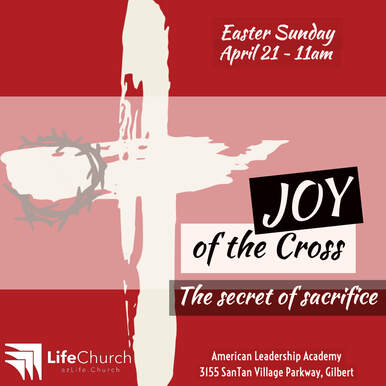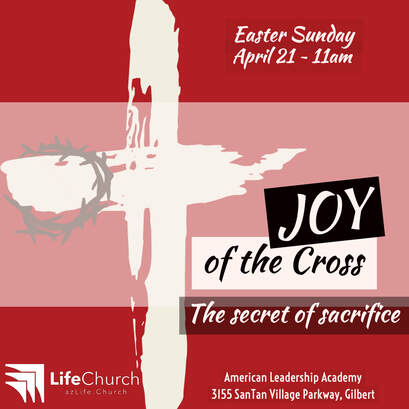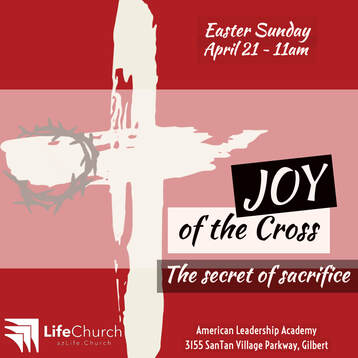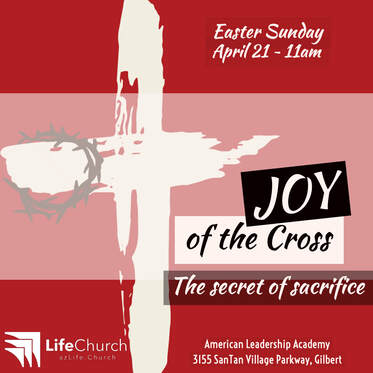AuthorTerry R Baughman is Lead Pastor for LifeChurch in Gilbert, AZ. See his complete bio at trbaughman.com Archives
July 2024
Categories |
Back to Blog
The Peace of Purpose4/28/2019  The Peace of Purpose JOY OF THE CROSS Terry R. Baughman “You will keep him in perfect peace, Whose mind is stayed on You, Because he trusts in You. Trust in the Lord forever, For in Yah, the Lord, is everlasting strength” (Isaiah 26:3–4). Living in God’s presence and in submission to His divine purpose produces incredible peace in what may otherwise be a chaotic culture. Elusive calm can be achieved when we surrender our ambitions to His unerring calling. There is serenity in embracing destiny; perfect peace when we are focused on His purpose. Isaiah revealed the secret to this “perfect peace” when he connected it to the strength of the Lord. If we continue to “trust in the Lord” our minds are steadied, settled in the assurance of God’s provision. In the Lord is “everlasting strength” and we find peace and security in Him. (See Isaiah 26:3–4.) Confidence in His inestimable strength enables us to have faith in His unending ability to bring unparalleled peace in our lives. In another passage Isaiah revealed that righteousness is an answer to a peaceful existence. He said, “The work of righteousness will be peace, and the effect of righteousness, quietness and assurance forever. My people will dwell in a peaceful habitation, in secure dwellings, and in quiet resting places” (Isaiah 32:17–18). Righteous actions result from a right relationship with Jesus. His righteousness leads us to a life that is secure, peaceful, and a place of quiet rest. His purpose is to live righteously; fulfilling His purpose produces peace. Paul wrote, “The grace of God that brings salvation has appeared to all men, teaching us that, denying ungodliness and worldly lusts, we should live soberly, righteously, and godly in the present age” (Titus 2:11–12). Jesus, the promised Son of Isaiah, was identified as the “Prince of peace” (Isaiah 9:6). He is the one who brings righteousness and peace. Jesus said, “Peace I leave with you, My peace I give to you; not as the world gives do I give to you” (John 14:27). Jesus came with a cause. He lived with the purpose to fulfill all righteousness. He died in the plan of God to bring us redemption, and rose to life to empower us with salvation. Conflict is inevitable and problems will often weigh heavily on our hearts. Christ’s call was, “Come to Me, all you who labor and are heavy laden, and I will give you rest. Take My yoke upon you and learn from Me, for I am gentle and lowly in heart, and you will find rest for your souls.” He went on to say, “My yoke is easy and My burden is light” (Matthew 11:28–30). While there are constraints we will find them easy; while the burdens have weight, we will find them light. Connection with Christ lifts the load and we will find rest even in the labor of our calling. Paul declared “that all things work together for good to those who love God, to those who are the called according to His purpose” (Romans 8:28). As we find ourselves in relationship with God and respond to His holy call, we will find assurance in our efforts and peace in His purpose. Scripture: “Looking unto Jesus, the author and finisher of our faith, who for the joy that was set before Him endured the cross” (Hebrews 12:2).
0 Comments
Read More
Back to Blog
Rejoicing in Sacrifice4/21/2019  Rejoicing in Sacrifice JOY OF THE CROSS Terry R. Baughman “Rejoice inasmuch as you participate in the sufferings of Christ, so that you may be overjoyed when his glory is revealed. If you are insulted because of the name of Christ, you are blessed, for the Spirit of glory and of God rests on you” (1 Peter 4:13–14 NIV). No one sets out seeking suffering. There is a self-protective mechanism built into us that resists what is uncomfortable and recoils from pain. Involuntary muscles jerk our hands away from a hot surface, send shivers through our body when we are exposed to cold, and supply a burst of energy to run from danger. It is natural to avoid the uncomfortable and shun suffering. However, there are circumstances that will cause us to run toward danger and enable us to embrace suffering. We see it when the firefighter races into the face of the flames to rescue someone crying for help. Self-protection is overruled by the desire to save another who is in distress. When we see those who risk their lives to save someone else we proclaim them to be heroes and honor their acts of bravery. There is pain in childbearing, but there are more than 300,000 births every day. More than 130 million mothers give birth each year and the vast majority find that the suffering associated with childbirth was worth the result, a tiny miracle of new life to love and embrace. There are some who say, “never again,” but most will eventually be ready to endure the suffering again to embrace the joy of new birth. Perhaps that is the best way to understand the joy of Jesus, “Who, for the joy that was set before Him, endured the cross, despised the shame” (Hebrews 12:2). It’s not that He liked to suffer or received sadistic pleasure in affliction, but rather He focused on the result of the sacrifice. His purpose was more powerful than the pain. On Easter and everyday He is celebrated for His personal gift of life to us. It was His intense love for the world that drove Him to surrender His comfort and embrace the suffering of His sacrifice. In the end result we rejoice. He, “endured the cross,” but He is exalted in majesty! Our greatest joy is to identify with Him. Knowing His ultimate sacrifice inspires us to endure hardship. Experiencing His passion we are motivated to, “Take up [the] cross daily and follow” (Luke 9:23). Identifying with Christ is coming to know Him in fellowship with His suffering. Paul’s desire was to, “know Him and the power of His resurrection, and the fellowship of His sufferings, being conformed to His death,” that he might also, “attain to the resurrection from the dead” (Philippians 3:10–11). We find that we can endure suffering if we know the sacrifice is justified. Paul said “The sufferings of this present time are not worthy to be compared with the glory which shall be revealed in us” (Romans 8:18). Perhaps this consideration of the reward of glory is what gives Christ-followers the ability to endure suffering and rejoice in sacrifice. Early disciples that were arrested and beaten, then commanded not to speak the name of Jesus left the council, “Rejoicing that they were counted worthy to suffer shame for His name” (Acts 5:41). What was their response to the punishment and warning? “Daily in the temple, and in every house, they did not cease teaching and preaching Jesus as the Christ” (Acts 5:42). They considered the reward greater than the threat of suffering. The secret of rejoicing in suffering is to reflect on the result of the sacrifice, the glory that will be revealed. Peter said, “rejoice inasmuch as you participate in the sufferings of Christ, so that you may be overjoyed when his glory is revealed” (1 Peter 4:13 NIV). Scripture: “Looking unto Jesus, the author and finisher of our faith, who for the joy that was set before Him endured the cross” (Hebrews 12:2).
Back to Blog
Humility in Exaltation4/14/2019  Humility in Exaltation JOY OF THE CROSS Terry R. Baughman “He humbled Himself and became obedient to the point of death, even the death of the cross. Therefore God also has highly exalted Him and given Him the name which is above every name” (Philippians 2:8–9). In one of the most striking contrasts during the final week of His life, Jesus rode on the back of a donkey from the Mount of Olives toward the city of Jerusalem accompanied by the noisy acclaim of a hero’s welcome. People lined the street waving palm branches and spreading their cloaks on the road. It was like a red carpet reception. Many disciples and others proclaimed, “Blessed is the King who comes in the name of the Lord! Peace in heaven and glory in the highest!” (Luke 19:38). It was a regal welcome and the closest thing to Him being proclaimed to be the Messiah. Yet the contrast was seen in the mode of transportation, a young donkey, a colt that had never been ridden. Rather than regal robes and fine silks on the runway, the path littered with outer tunics stained with sweat and the marks of honest labor. There was no pomp and circumstance, no prancing steeds or royal mounts, no soldiers marching or trumpets blaring, yet the procession became the triumphal entry of the Savior of the world; the King of Glory entering the city of His sacrifice for the last time. In the following verses Jesus wept over the knowledge of what was destined to happen shortly in this city. While it seemed to be the high point of His career and the crowning accomplishment to the years of His public ministry, Jesus remained the humble servant focused on the mission at hand. Jesus is always our example. In times of exaltation or humiliation He remained constantly and consistently the meek and gentle savior. (See 2 Corinthians 10:1.) Our aspiration is to follow His example and to take on His attributes. Paul said, “Let this mind be in you which was also in Christ Jesus, who, being in the form of God, did not consider it robbery to be equal with God, but made Himself of no reputation, taking the form of a bondservant, and coming in the likeness of men” (Philippians 2:5–7). He continues with the text above where He humbly accepted the death on the cross. Jesus submitted to this ultimate humiliation to provide the atonement for the sins of the world. Because Jesus humbled Himself and submitted to gruesome death, the result was exaltation in glory. Paul continued, looking beyond His humiliation and death on the cross, and declared, “God also has highly exalted Him and given Him the name which is above every name, that at the name of Jesus every knee should bow, … and that every tongue should confess that Jesus Christ is Lord” (Philippians 2:9–11). Before His exaltation He endured humiliation, before being crowned with glory, He was crowned with thorns. His sacrifice and death preceded the resurrection and rejoicing. Perhaps it was with this ultimate result in view that He was able to “despise the shame,” and while anticipating the reward of life, He was able to endure the punishment of the cross. The writer of Hebrews said, “For the joy set before him he endured the cross, scorning its shame, and sat down at the right hand of the throne of God” (Hebrews 12:2 NIV). Scripture: “Looking unto Jesus, the author and finisher of our faith, who for the joy that was set before Him endured the cross” (Hebrews 12:2).
Back to Blog
Love to the Finish4/6/2019  Love to the Finish JOY OF THE CROSS Terry R. Baughman “We do this by keeping our eyes on Jesus, the champion who initiates and perfects our faith. Because of the joy awaiting him, he endured the cross, disregarding its shame. Now he is seated in the place of honor beside God’s throne” (Hebrews 12:2 NLT). The display of God’s great love was showcased at Calvary. All of His intended purpose culminated on the cross. Jesus explicitly revealed His purpose when He stated, “the Son of Man has come to seek and to save that which was lost” (Luke 19:10). Because of God’s great love He came to this earth to rescue us from the penalty of sin and ultimately save us from the judgment of death. John said, “God so loved the world that He gave His only begotten Son, that whoever believes in Him should not perish but have everlasting life” (John 3:16). No doubt it was difficult for the disciples to see that through His sacrifice He would provide salvation for all of humanity. The disciples sought to excuse Him from sacrifice and relieve Him from the requirements of judgment, but His purpose was clear and His vision drove Him to accomplish everything that was necessary to provide redemption. “From that time Jesus began to show to His disciples that He must go to Jerusalem, and suffer many things from the elders and chief priests and scribes, and be killed, and be raised the third day” (Matthew 16:21). The atonement was a bitter cup from which to drink and its nectar an incredible agony of suffering. Jesus agonized in prayer, “Father, if it is Your will, take this cup away from Me; nevertheless not My will, but Yours, be done” (Luke 22:42). Luke revealed that “an angel appeared to Him from heaven, strengthening Him” (Luke 22:43). Jesus resignation to the will of the Father in the garden of Gethsemane brought about peace and the strength to complete His task. Even when facing death Jesus told Pilate, “For this cause I was born, and for this cause I have come into the world, that I should bear witness to the truth” (John 18:37). Love compelled Him to complete the required commitment. Love drove Him to pay the ultimate price, death on the cross. He was determined to see it through to completion. When Jesus said, “It is finished,” it was more than the resignation of life, but a confident declaration of accomplishment. He had prevailed. The price had been paid. The sacrifice was offered. His mission was complete. It was finished! Jesus is both author and finisher of our faith. He is the Champion who initiated the conflict and the Victor who defeated death itself. He reigns victorious over death, hell, and the grave! Because He is the finisher we can have great confidence that He will complete what He has started in us. Regardless of our failures and shortcomings we find Him to be enduringly faithful. His love endures forever and His mercy is never ending. Paul said, “being confident of this very thing, that He who has begun a good work in you will complete it until the day of Jesus Christ” (Philippians 1:6). He is faithful to complete what He has begun in your life. Love leads to the finish! Scripture: “Looking unto Jesus, the author and finisher of our faith, who for the joy that was set before Him endured the cross” (Hebrews 12:2). |


 RSS Feed
RSS Feed